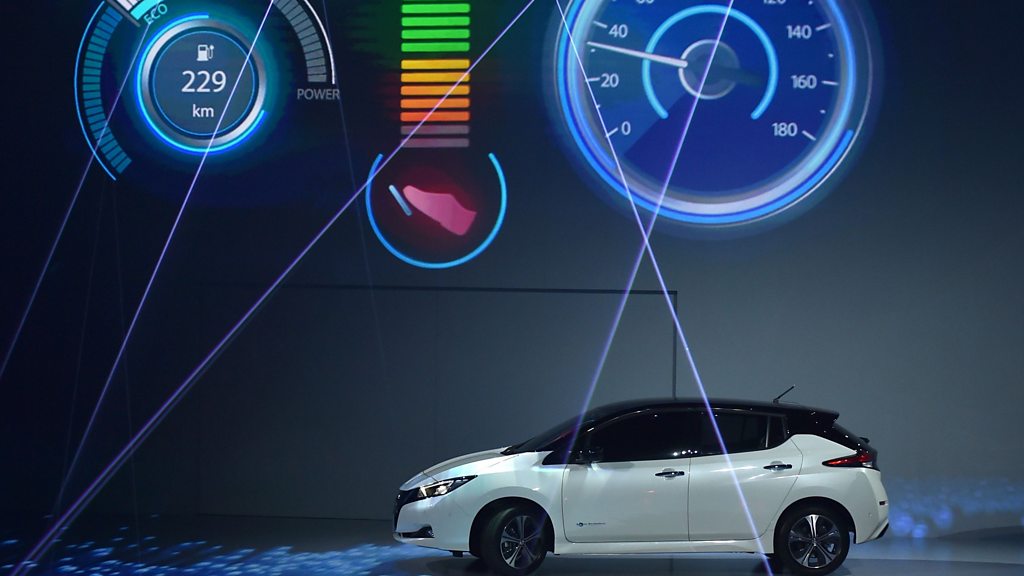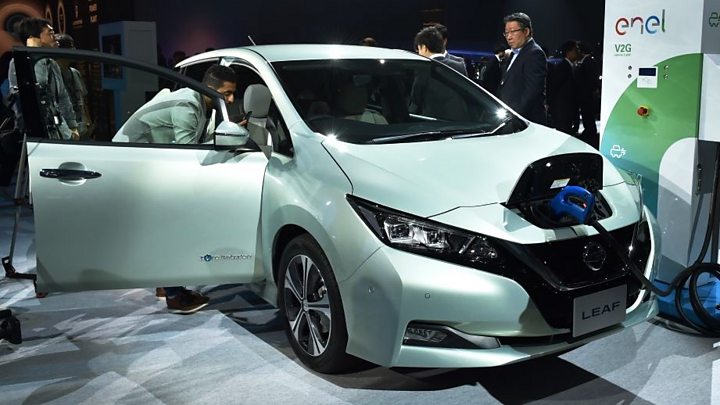Electric Nissan Leaf Revamp Drives Further


Nissan has launched a longer-range version of its best-selling Leaf electric vehicle, as it fights growing competition in the electric car market.
The new Leaf can travel about 50% further on a single charge than its predecessor, according to the firm.
But it still falls short of the ranges offered by other recent electric cars from Tesla and General Motors.
Other updates include a new one-pedal driving system, auto-parking tech and a more modern design.
More than 283,000 Leaf cars have been sold since the Japanese firm launched the brand in 2010, making it the world's most purchased electric car.
However, it is facing increasing competition in the fast-developing "green" car market, fuelled in part by tightening emissions standards around the world.
"The general industry standard for model cycles is around six-to-seven years, so the launch of the second generation Leaf falls neatly in to this timeframe," commented Ian Fletcher, principal automotive analyst at the IHS Markit consultancy.
"However, the next three to four years looks set to see further upgraded and brand new vehicles, and manufacturers in this space still have everything to play for."
What's new?
The new Leaf, on sale in Japan from October and elsewhere early next year, has a longer range thanks to a bigger 40 kilowatt hour (kWh) battery.
Because different territories have different tests for electric vehicles, the new Leaf's quoted range varies according to where it will be sold:
- in Europe it is 378km (235 miles)
- in Japan it is 400km (248 miles)
- in the US it is 241km (150 miles)
Electric cars tend to achieve about 20-25% below the European quoted figures in real-world tests.
However, Nissan says the introduction of a one-pedal system - in which a button press turns the accelerator pad into an "e-Pedal" that can start, accelerate, brake and stop the vehicle - will provide added energy efficiency gains.
Motorists can, however, drive with both a separate accelerator and brake pedal if they prefer.
Chris Lilly, content manager for the Next Green Car news site, said while the new model was not "groundbreaking" it should be more appealing to drivers.
"It takes every element of the old Leaf and improves upon it, and adds a whole lot of new features," he said.

Those improvements also include an automated parking system, called ProPilot Park, that will take control of the vehicle to manoeuvre it into tricky spaces.
The system can handle parallel parking, according to the firm, and can deal with up to seven-point turns. Drivers can also use dashboard controls to make adjustments to the parking spot in advance if they feel it is necessary.
The model also automates single-lane highway driving.
Prices will start at 3,150,360 yen (£22,220), Nissan said. The Japanese carmaker said it would offer a higher priced model, with greater power and range, next year.
How it compares
Competition in the electric vehicle market is intensifying as major automakers join specialised manufacturers to develop high-tech, low-emission cars.
"Electric vehicle technology is advancing rapidly - costs are falling quickly and range is improving," said Prof David Bailey, an automobile expert at Aston Business School.
But despite boosting its range, rival models can go further than Nissan's latest offering.
The Tesla Model 3 can run between 354km to 499km (220 to 310 miles), according to US tests. It starts at $35,000 (£26,850).
General Motor's Chevy Bolt - which is rebadged as the Opel Ampera E in parts of Europe - has a quoted range of 238 miles (383 km), according to the same measurement system. It starts at about $38,000 (£29,150).
US automaker Tesla is one of the pioneers in the electric vehicle industry and despite recently releasing its cheapest model to date, it has traditionally catered to the premium end of the market.
The Nissan Leaf faces more direct competition from models including the Volkswagen e-Golf, BMW i3 and Hyundai's Ioniq.
"The Leaf is not going to challenge Tesla," Next Green Car's Mr Lilly said. "But the Leaf has price and manufacturing capacity on its side."
"You're getting a lot less range but you're paying a lot less," he said.
Analysis:
Richard Westcott, Transport correspondent
Something's definitely changed since VW was caught fiddling its diesel emissions tests in the US.
Car companies are accelerating plans for electric vehicles. Volvo says that after 2019, every new model will have some sort of electric engine on board. Jaguar's launching a rather gorgeous rival to the Tesla.
But big problems still remain.
Every significant journey needs planning. Someone at work (no names) tried to get to England's West Country in his new electric car last week, and didn't check the charge points properly. The first two were broken - he had not checked their status online in advance.
Electric cars are also expensive. They are hard to charge if you live in a terraced house. The batteries lose power after a few years, and the country will need extra power stations to cope if everyone suddenly starts charging their cars.
Diesel and petrol cars work because they are so convenient. Go anywhere. Fill up in minutes. And they can be very cheap to buy. Electric cars aren't nearly there yet.
Electric future
Nissan was one of the first automakers to market an electric vehicle to the masses when it launched the first Leaf in 2010. The Leaf became the world's biggest-selling, all-battery car, with more than 280,000 units sold.
Despite heavy investment, electric vehicles still represent only a fraction of conventional vehicle sales.
Just over two million electric vehicles were registered worldwide as of 2016, according to the International Energy Agency, just a slice of the more than 80 million vehicles sold last year.
One big opportunity is China. Automakers are jostling for a piece of the world's biggest car market ahead of the introduction of new rules designed to fight pollution.
China wants electric battery cars and plug-in hybrids to account for at least one-fifth of its vehicle sales by 2025.
European production of the last-generation Leaf has taken place in Sunderland, which has produced more than 70,000 of the electric vehicles.
A spokesman for Nissan told the BBC the firm had yet to announce where the new version would be produced.
From Chip War To Cloud War: The Next Frontier In Global Tech Competition
The global chip war, characterized by intense competition among nations and corporations for supremacy in semiconductor ... Read more
The High Stakes Of Tech Regulation: Security Risks And Market Dynamics
The influence of tech giants in the global economy continues to grow, raising crucial questions about how to balance sec... Read more
The Tyranny Of Instagram Interiors: Why It's Time To Break Free From Algorithm-Driven Aesthetics
Instagram has become a dominant force in shaping interior design trends, offering a seemingly endless stream of inspirat... Read more
The Data Crunch In AI: Strategies For Sustainability
Exploring solutions to the imminent exhaustion of internet data for AI training.As the artificial intelligence (AI) indu... Read more
Google Abandons Four-Year Effort To Remove Cookies From Chrome Browser
After four years of dedicated effort, Google has decided to abandon its plan to remove third-party cookies from its Chro... Read more
LinkedIn Embraces AI And Gamification To Drive User Engagement And Revenue
In an effort to tackle slowing revenue growth and enhance user engagement, LinkedIn is turning to artificial intelligenc... Read more

